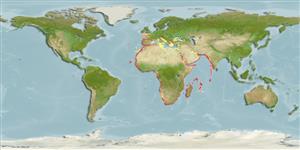Preferred temperature (Ref.
115969): 11.9 - 19.7, mean 15 (based on 71 cells).
Índice de diversidade filogenética (Ref.
82804): PD
50 = 0.5000 [Uniqueness, from 0.5 = low to 2.0 = high].
Bayesian length-weight: a=0.00851 (0.00551 - 0.01314), b=3.13 (3.00 - 3.26), in cm Total Length, based on LWR estimates for this species & Genus-body shape (Ref.
93245).
Nível Trófico (Ref.
69278): 3.4 ±0.44 se; based on food items.
Resiliência (Ref.
120179): médio(a), tempo mínimo de duplicação da população 1,4 - 4,4 anos (K=0.26).
Prior r = 0.55, 95% CL = 0.36 - 0.82, Based on 2 data-limited stock assessments.
Fishing Vulnerability (Ref.
59153): Moderate vulnerability (44 of 100).
Climate Vulnerability (Ref.
125649): Moderate vulnerability (41 of 100).
